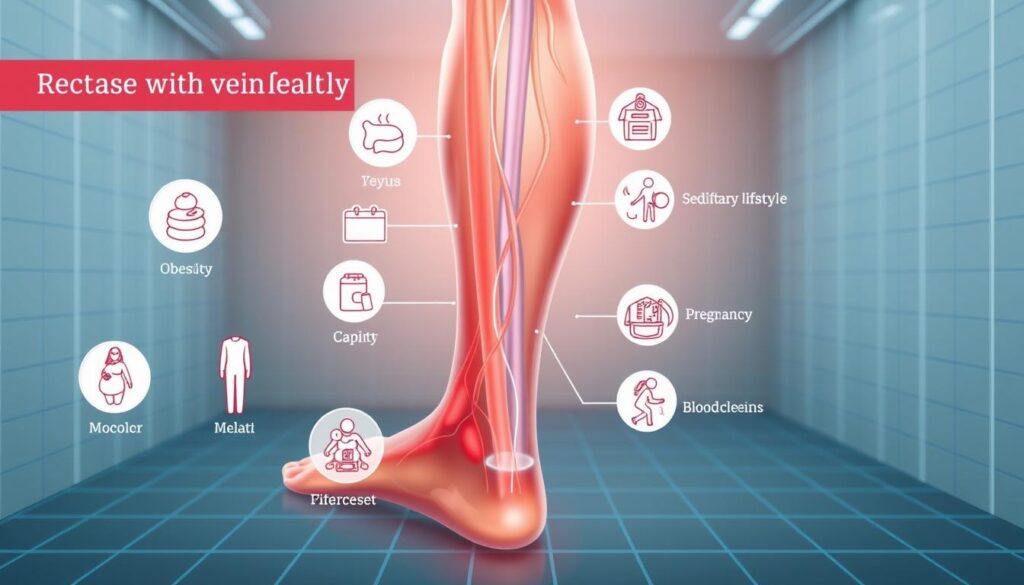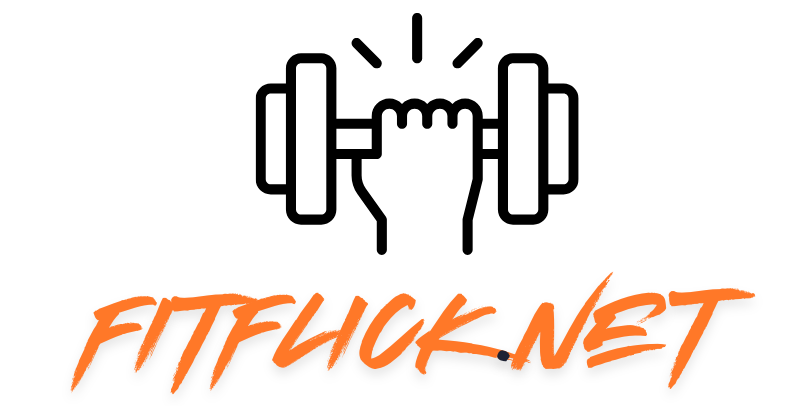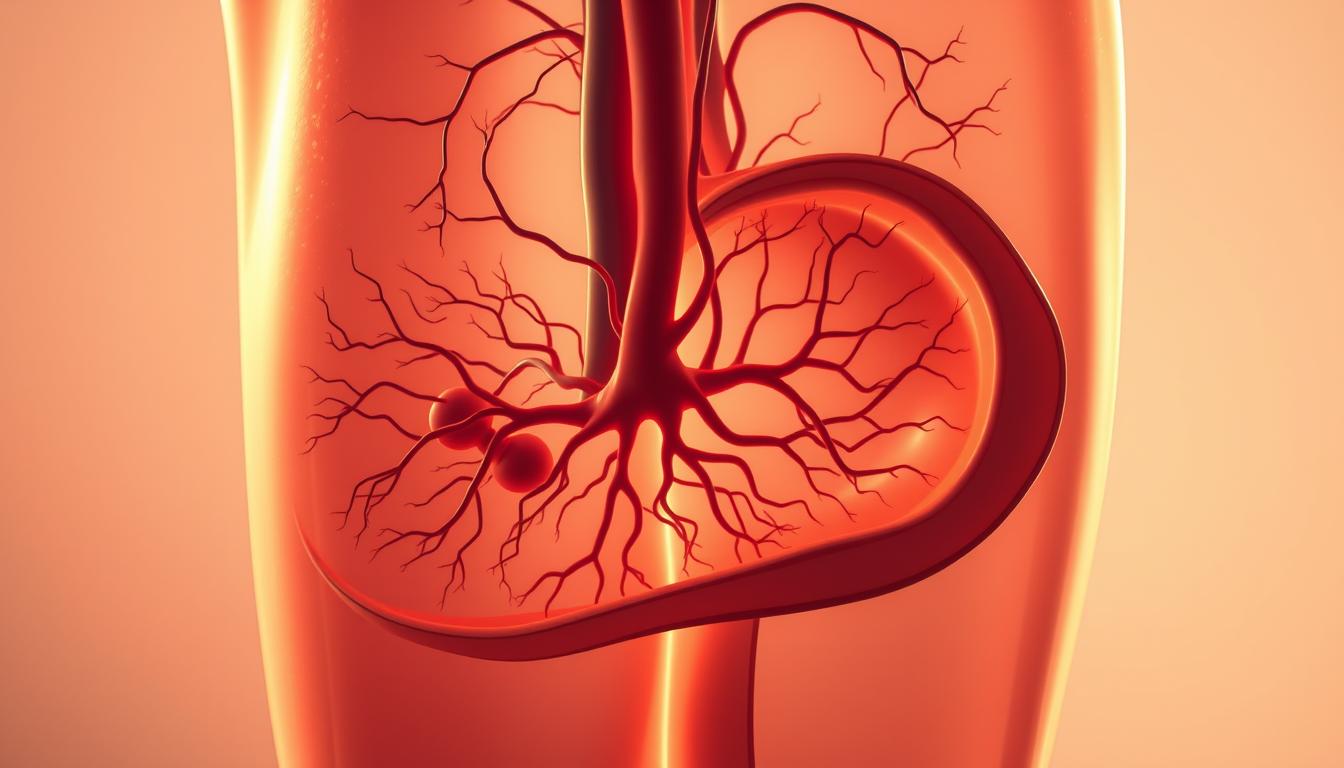An adult human body has a vast network of blood vessels. If all these vessels were laid end to end, they could stretch up to 100,000 miles. This network of veins and arteries is vital for your health and how your cells function1.
Your venous health is more important than you might think. Blood circulation is key to your body’s life. It carries oxygen, nutrients, and takes away waste from every cell. Knowing how vital your vein health is can change your long-term health for the better.
Deep vein thrombosis affects millions and shows how vulnerable our veins can be. Over 2 million Americans get DVT each year. It can cause more problems than breast cancer, car accidents, and HIV combined1.
The blood circulation system in our bodies is very complex. It gives cells the nutrients they need and helps new cells grow. This makes vein health a key part of staying healthy.
Key Takeaways
- Your body contains an extensive network of blood vessels spanning up to 100,000 miles
- Venous health is crucial for cellular nutrition and waste removal
- Deep vein issues can have significant health implications
- Blood circulation supports every bodily function
- Understanding vein health can prevent serious medical complications
Understanding Your Venous System Fundamentals
Your body’s blood vessels form a complex network that keeps you alive and healthy. Knowing how your venous system works helps you see the intricate mechanisms that support your circulatory health.
The Architecture of Blood Vessels
Blood vessels are more than simple tubes. They are a sophisticated system designed to move blood throughout your body. The venous system is key in returning deoxygenated blood from your tissues to the heart2.
- Veins have thin, flexible walls
- They contain specialized venous valves
- Blood vessels adapt to different body regions
How Veins Work in Your Body
Vein function is more complex than just blood transport. These vessels work against gravity, especially in your legs, to push blood back to your heart. The muscles around veins help push blood upward2.
The Role of Venous Valves
Venous valves are tiny but crucial. They prevent blood from flowing backward. They act like one-way gates, ensuring blood moves in the correct direction2.
| Valve Type | Primary Function | Location |
|---|---|---|
| Unidirectional Valves | Prevent Blood Backflow | Leg Veins |
| Venous Check Valves | Maintain Directional Blood Flow | Deep Venous System |
“Your veins are silent heroes, working constantly to keep your blood circulating efficiently.” – Vascular Health Experts
Maintaining healthy blood vessels and understanding vein function can significantly impact your overall cardiovascular wellness.
The Silent Flow: Why Your Venous Health Matters More Than You Think
Your venous health is key to your overall wellness. Yet, it’s often overlooked until problems arise. Almost 40% of Americans face chronic venous insufficiency, making it a big health issue3. The impact of circulation on your body is more complex than you might think.
Silent vein issues can sneak up on you, posing unexpected risks. Varicose veins are more than just a cosmetic issue. They can lead to serious problems4:
- Pain and discomfort in affected areas
- Potential formation of blood clots
- Risk of developing deeper vascular conditions
Deep vein thrombosis (DVT) is a dangerous silent vein issue. If a blood clot breaks free, it can travel to your lungs. This can be life-threatening, causing a pulmonary embolism5. Your body’s circulatory system needs constant care to avoid such dangers.
Understanding your venous health is not just about preventing complications—it’s about maintaining your overall quality of life.
To manage your venous health, watch for warning signs and live a healthy lifestyle. Regular exercise, good nutrition, and medical check-ups can lower your risk of serious circulatory problems5.
Common Signs of Venous Health Issues
Your body sends out signals about vein health. These signs can help you catch problems early. This way, you can get the right medical care.
Visual Symptoms to Watch For
Changes in your veins can show venous issues. Look out for varicose and spider veins:
- Twisted, bulging varicose veins that appear blue or purple
- Fine, web-like spider veins spreading across the skin surface
- Discoloration or changes in skin texture around vein areas
Physical Sensations and Warning Signs
Your body also signals venous problems through physical feelings. These signs can mean circulation issues:
| Symptom | Potential Significance |
|---|---|
| Leg cramping | Possible vein circulation restriction |
| Heavy or aching legs | Indicator of venous insufficiency |
| Swelling in lower extremities | Sign of potential vascular issues |
| Itching or tingling sensations | Potential nerve or circulation problem |
When to Seek Medical Attention
Some symptoms need quick doctor visits. Chronic venous disorders affect many, with up to 70% of women and 50% of men affected6. See a doctor if you have:
- Persistent leg pain that doesn’t improve
- Sudden swelling in one leg
- Skin changes around vein areas
- Unexplained leg warmth or redness
Early detection can prevent more serious venous complications and improve your overall vascular health.
Not all vein changes are serious, but knowing your body’s signals is key for good vein health7.
Risk Factors Affecting Your Vein Health

Knowing the risks for venous disease can help keep your veins healthy. Vein health risks are complex and involve many factors that can affect your blood flow8.
Several key risk factors contribute to potential vein problems:
- Genetic predisposition8
- Age-related changes
- Hormonal fluctuations
- Body weight and lifestyle choices
Almost 40% of Americans will face chronic venous insufficiency at some point9. Your lifestyle choices can greatly affect your veins, especially if you sit or stand for long periods8.
Specific venous disease factors include:
- Weight Management: Being overweight increases vein risks8
- Physical Activity: A sedentary lifestyle raises venous health risks8
- Hormonal Changes: Pregnancy can make vein problems more likely8
“Your vein health is a window into your overall cardiovascular wellness”
Other risk factors include smoking, family history, and past deep vein thrombosis8. By understanding these risks, you can take steps to keep your veins healthy and avoid complications.
The Impact of Lifestyle on Venous Health
Your daily choices are key to keeping your veins healthy. Lifestyle and vein health are closely tied. Every choice you make can impact your circulatory system’s health10.
Daily Habits That Affect Your Veins
Your daily activities can greatly affect your veins. Sitting or standing for long periods can harm blood flow11. Here are some important habits to keep in mind:
- Take frequent movement breaks
- Maintain proper posture
- Avoid crossing legs for extended periods
- Elevate your legs when possible
Exercise and Movement Patterns
Exercise is vital for vein health. Regular physical activity can lower stress hormones by up to 30% and boost vein health10. Walking is a great low-impact exercise11.
Pro tip: People who exercise regularly are 50% less likely to get vein problems than those who don’t10.
Dietary Influences on Vein Health
Your diet affects your veins. Eating right can help your veins by:
- Reducing salt intake
- Consuming fiber-rich foods
- Staying hydrated
- Eating foods low in cholesterol
Keeping a healthy weight is also important. Being overweight raises the risk of varicose veins and chronic venous insufficiency12.
Prevention Strategies for Optimal Vein Health

Keeping your veins healthy starts with taking action. It’s not just about avoiding problems. It’s about building a strong foundation for your veins to stay healthy for years13.
Your daily habits are key to keeping your blood flowing well. Here are some important tips for vein care:
- Stay Active: Moving your body regularly boosts blood flow. Walking for more than five minutes every 1.5 hours can help prevent spider veins13.
- Manage Weight: Being overweight puts extra pressure on your leg veins. This can lead to vein problems13.
- Use Compression Stockings: These special socks help improve blood flow and lower vein pressure13.
Changing your diet and lifestyle is vital for vein health. Hormonal changes can affect your veins, so listening to your body is important13.
Regular doctor visits are key for catching and treating vein problems early. By following these tips, you can help your veins stay healthy and avoid vein-related issues13.
Small, consistent actions can make a significant difference in maintaining healthy veins.
Treatment Options for Venous Problems
Venous health issues affect millions in the U.S. There are many treatments for different problems. Learning about these options can help you find relief and improve your circulation14.
About 25% of adults in the U.S. face venous problems. This makes finding effective treatments very important14. Luckily, there are many non-invasive options available today.
Conservative Management Approaches
First, doctors try non-invasive ways to manage veins:
- Compression stockings help blood flow better15
- Making lifestyle changes to lessen vein stress
- Exercising regularly to boost leg muscle function
- Managing weight to ease vein pressure
Medical Interventions Available
If simple methods don’t work, doctors have more advanced treatments:
- Sclerotherapy has a 60-80% success rate for varicose veins14
- Endovenous laser treatment (EVLT) is over 90% effective14
- Radiofrequency Ablation (RFA)
- VenaSeal™ Closure System
Latest Treatment Technologies
New vein treatments focus on quick, less invasive methods. These allow for fast recovery times. You can get treated and go back to your daily life soon15.
Every patient deserves a personalized approach to vein health, tailored to their specific condition and needs.
Talking to a vein specialist is key to finding the right treatment for you15.
The Connection Between Stress and Vein Health
Your vein health is closely tied to your stress levels. This creates a complex relationship that can greatly affect your circulation and overall well-being. Stress can trigger responses in your body that harm your veins, potentially leading to vascular problems16.
Mental stress has a big impact on your body. Two-thirds of people have felt significant stress in the last two weeks17. This ongoing stress can cause serious issues with your veins, including:
- Reduced blood circulation
- Potential vein damage
- Increased inflammation
- Higher risk of varicose veins
Chronic stress can also raise your risk of high blood pressure by over 60%. This directly affects your vein health and circulation16. The strain can weaken your blood vessel walls, making veins more prone to damage.
“Stress is not just a mental state – it’s a physical burden on your entire cardiovascular system.”
To keep your veins healthy and manage stress, try these lifestyle changes:
- Practice daily yoga for 10 minutes18
- Eat foods that help reduce stress, like leafy greens and avocados
- Stay active with regular exercise
- Use relaxation techniques
Managing stress is key to keeping your veins healthy and your overall wellness in check. By understanding how stress affects your veins, you can take steps to protect your circulatory health17.
Conclusion
Your vein care is key to your health, not just a medical issue. Knowing how vital venous health is can greatly improve your well-being. About 1 in 5 adults in the U.S. deal with Chronic Venous Insufficiency, showing how common vein problems are19.
Keeping your veins healthy requires effort. Regular exercise like walking, biking, and swimming boosts blood flow19. Drinking enough water, about 84 oz a day, also helps keep blood flowing well19. Your choices in life can help avoid vein issues.
Don’t wait to get help. Vein treatments are safe and work well, with little time off needed20. Whether it’s simple steps or more advanced treatments, acting early can make a big difference. Your vein health is a big part of staying well.
FAQ
What exactly is the venous system?
How can I tell if I have vein health problems?
Are certain people more at risk for vein issues?
Can diet and lifestyle impact vein health?
What are compression stockings, and do they really help?
When should I see a vein specialist?
How does stress affect vein health?
Are there natural ways to improve vein health?
What medical treatments are available for vein problems?
Can vein problems be prevented?
Source Links
- Deep Vein Thrombosis: Myths & Facts – Sierra Hematology & Oncology – https://www.sierrahemonc.com/blog/deep-vein-thrombosis-know-18-myths-and-facts/
- Understanding Deep Vein Thrombosis (DVT/PE) | Vein Specialists of the South – https://www.veinspecialists.com/blog/understanding-deep-vein-thrombosis-dvt-pe/
- Northwest Houston Heart Center: Cardiology – https://www.houstonheartcenter.com/blog/when-varicose-veins-are-more-than-a-cosmetic-concern
- Northwest Houston Heart Center: Cardiology – https://www.houstonheartcenter.com/blog/4-conditions-that-impact-your-leg-circulatio
- What’s Causing My Poor Blood Circulation in My Legs and Feet? – https://www.cvmus.com/vascular-treatment/poor-circulation-treatment-and-causes
- Symptoms in Dilating Venous Disease – https://pmc.ncbi.nlm.nih.gov/articles/PMC7536814/
- 6 Blood Clot Signs You Shouldn’t Ignore – https://health.clevelandclinic.org/blood-clot-warning-signs
- Understanding Chronic Venous Disease: A Critical Overview of Its Pathophysiology and Medical Management – https://pmc.ncbi.nlm.nih.gov/articles/PMC8348673/
- Northwest Houston Heart Center: Cardiology – https://www.houstonheartcenter.com/blog/can-varicose-veins-cause-danger-to-my-health
- How Stress Affects Your Vein Health | St Louis Laser Veins – https://www.stlouislaserveins.com/2023/04/10/the-silent-killer-how-stress-affects-your-vein-health/
- The Importance of Early Detection and Treatment of Vein Disease – https://www.metroveincenters.com/blog/the-importance-of-early-detection-and-treatment-of-vein-disease
- The Link Between Vein Health and Cardiovascular Wellness – https://www.centerforvein.com/blog/the-link-between-vein-health-and-cardiovascular-wellness
- Top Strategies for Healthier Legs: How to Prevent Spider Veins | CURA Vein Centers – https://curaveindoctors.com/how-to-prevent-spider-veins-for-healthier-legs-top-strategies/
- Signs You Should Get Treated For Vein Problems – https://www.virtua.org/articles/signs-you-should-get-treated-for-vein-problems
- Varicose Veins: Understanding Your Treatment Options – From Conservative to Cutting-Edge – https://www.bassveincenter.com/blogs/varicose-veins-understanding-your-treatment-options—from-conservative-to-cutting-edge
- Northwest Houston Heart Center: Cardiology – https://www.houstonheartcenter.com/blog/the-impact-of-stress-on-your-vascular-health
- Mental Stress and Its Effects on Vascular Health – https://pmc.ncbi.nlm.nih.gov/articles/PMC9058928/
- To Reduce Stress and The Risk of Varicose Veins – https://www.ukveinclinic.com/blog/stress-and-varicose-veins-what-you-can-do-to-reduce-the-risk
- Symptoms of Poor Circulation in the Body | Vascular Issues – https://vitalheartandvein.com/news/symptoms-of-poor-circulation-in-the-body-vascular-issues
- The Benefits of Vein Treatment: Why You Should Consider It | Vein Treatment, Varicose & Spider Vein Specialist in Ventura & Los Angeles – https://www.centerforveinwellness.com/2022/12/16/the-benefits-of-vein-treatment-why-you-should-consider-it/




